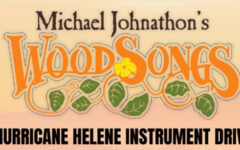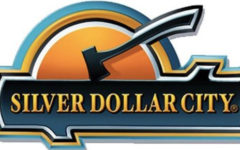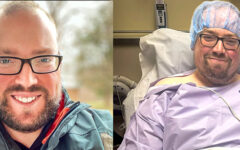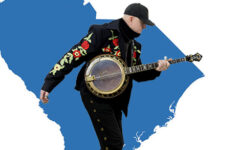This post is part of our occasional feature, Songwriter Profiles. If you have a suggestion for a bluegrass songwriter we might want to consider, please contact us.
 Originally from Jacksonville, Florida, Chris Stuart plays guitar and leads his own band, Backcountry, based in Del Mar, California. His first professional involvement in bluegrass was as a banjo player in the band Salt Run in St. Augustine, Florida, in 1984, and then, after moving to upstate New York, as the banjo and mandolin player in the group Cornerstone, founded in 1991 by Stuart, Pam Daley, Rick Manning and Dana Paul, in Ithaca, New York. The band won the Winterhawk (now Grey Fox) band contest that year and then showcased at the IBMA Convention in 1992.
Originally from Jacksonville, Florida, Chris Stuart plays guitar and leads his own band, Backcountry, based in Del Mar, California. His first professional involvement in bluegrass was as a banjo player in the band Salt Run in St. Augustine, Florida, in 1984, and then, after moving to upstate New York, as the banjo and mandolin player in the group Cornerstone, founded in 1991 by Stuart, Pam Daley, Rick Manning and Dana Paul, in Ithaca, New York. The band won the Winterhawk (now Grey Fox) band contest that year and then showcased at the IBMA Convention in 1992.
From an early age, Stuart wrote poetry and stories. He remembers writing a fable when he was ten, and he wrote poetry in high school. Both his parents wrote poetry and listened to a wide range of music. His father was a Disciples of Christ minister and his mother a sixth-grade school teacher. There were always books and music in the house. Everyone in the family liked a different kind of music, so they listened to everything from Hank Williams to Cleo Laine.
It was during his time with Cornerstone that Stuart began writing songs, inspired by the voice of Ms Daley, the lead singer with the band. His first song was Paul And Peter Walked, which Claire Lynch heard and recorded on her gospel album. She also recorded another Chris Stuart song God Spoke His Name, and a Cajun song, Thibodeau, on her next album.
Stuart’s talent as a songwriter was further evident as he won the Chris Austin Songwriting contest at the 1993 Merlefest in both bluegrass‚Äìwith Maggie’s Daughter‚Äìand gospel‚Äìwith God Spoke His Name‚Äìcategories. Both songs are on Cornerstone’s first CD Maggie’s Daughter, along with three other Stuart-penned songs.
Other Chris Stuart songs to find favor with bluegrass singers are Dear Friends and Gentle Hearts, on the Suzanne Thomas album of the same name; Saro, on Sally Jones’ Love Hurts CD; Dale Ann Bradley recorded Julia Belle on her Catch Tomorrow album; and Larry Cordle recorded a Chris Stuart song, The First Train Robbery for his recent album, Took Down and Put Up. Also, Danny Paisley recorded Don’t Throw Mama’s Flowers Away, on his The Room Over Mine album (The song is on the final ballot for IBMA Song of the Year); Michael Cleveland recorded Farewell for a Little While on his Leavin’ Town CD; Bobby Osborne recorded Stuart’s Civil War ballad Shenandoah Wind, and Doyle Lawson recorded a Chris Stuart gospel song, When the Last of Our Days Shall Come, which is on the final ballot for IBMA Gospel Recording of the Year.
In 1996 he moved to California, where, in 2002, with Janet Beazley, he started Backcountry, a band that they put together to promote their first album, Angels of Mineral Springs. Stuart says,
“I’m really lucky to have someone like Janet Beazley to work with. I’ve co-written a couple of songs with her, including “Jealous Crow”, but also she’s able to respond to my songs and suggest melodic and alternate ways of doing things, and also she’s a genius at arrangement and recording, so she’s not only an inspiration, she’s essential to my writing.”
As well as being a great songwriter, Stuart is a writer of high-quality articles about his bluegrass peers. His stories about Russell Moore & IIIrd Tyme Out, Ralph Stanley, Del McCoury, The Circuit Riders, The Grascals, Cadillac Sky and Blue Highway, among others, have been featured in Bluegrass Unlimited in recent months. He was the IBMA’s Print Media Person for 2008, and he makes a living as a copy editor for several comic book publishers in San Diego. He recently worked on the Transformers, GI Joe, and Joss Whedon’s Angel series. He also works part-time as an editor in the Biology department at the University of California, San Diego.
How many songs have you written and out of those, how many have been recorded?
I haven’t counted, but I’ve probably written well over 100 and about 50 have been recorded by our band or others.
Who has influenced your songwriting most?
Stephen Foster, Carter Stanley, Townes Van Zandt, Jesse Winchester, Bill Monroe, Paul Simon, Tom and Dixie Hall, Lester Flatt, Jimmy Webb, Joni Mitchell, John Prine, Larry Cordle, Carl Jackson, Pete Goble, and on and on. I think Larry Sparks’s John Deere Tractor was the first bluegrass album where I thought, okay, that’s amazing songwriting. There’s a lot of great songs by different songwriters on that album. I believe it took bluegrass songwriting to a new level and it really inspired me. Still does. I think it’s the bluegrass White Album.
Most of your songs have been recorded by your own group; who else has recorded songs by you? Were these pitched to or commissioned by others?
I’ve been lucky enough to have had my songs recorded by Claire Lynch, Dale Ann Bradley, Larry Cordle, Dan Paisley, Michael Cleveland, Bobby Osborne, Doyle Lawson, Sally Jones, Suzanne Thomas, Janet Beazley, Eric Uglum, and others; and have a song coming out in the next few months recorded by an Irish group, Cherish the Ladies.
One of my most recorded songs has been Twenty Naked Pentecostals in a Pontiac, based on a true story, which I wrote as a challenge from someone on bgrass-L [the bluegrass listserv run by Frank Godbey at the University of Kentucky]. I’ve never had a song commissioned‚Äìthat would be a daunting project to have someone give me specs for a song, although it would be interesting to try.
All the cuts I’ve gotten were due to some odd bit of serendipity where the artist heard the song done by our band or someone else, or I handed them a CD at a festival we were playing. As soon as I hand someone a demo, I forget about it because it’s such a long-shot to get a song cut. I just assume no one would be interested, so I’m always surprised and happy to hear that someone wants to cut one of my songs. I seldom actively pitch songs, though.
What advice can you give if someone wanted to write a song for a hard-core traditional bluegrass band, as opposed to a contemporary group?
If you’re trying to write a traditional bluegrass song, you still need to make it sound fresh. That’s the challenge, to make it feel like it was written fifty years ago, but also like it’s something you haven’t heard before. To me, the hardest song to write is an up-tempo bluegrass song, just for that reason. My advice is to listen to how Monroe and others did it and pick out things you like and build on that. Not enough songwriters really listen to the first generation. Listen to those old songs until you just have to write one of your own.
You have won prizes for your songwriting; tell me about them ….
I won the Chris Austin songwriting contest at Merlefest in 1993 in both the bluegrass and gospel categories. And I was nominated by SPBGMA as Songwriter of the Year in 2006. To me, though, the greatest award a songwriter can get is when you hear a song of yours played by a group jamming around a campfire at a festival when they don’t know you wrote the song.
How did Dale Ann Bradley pick up Julia Belle?
Janet Beazley recorded it on her album 5 South, and Dale Ann heard us do it, I think, at IBMA one year. It was quite an honor to have her record it. She is an amazing singer, a wonderful person, and a great songwriter. She’s also one of the best rhythm guitar players out there, something she doesn’t get enough credit for.
Which songs have you had on The Bluegrass Unlimited National Bluegrass Survey and what was the peak position for each? Were they your own recordings or by others?
I can’t recall, but I think it’s up to eight or nine now. Our band song Crooked Man, the title cut of our new album, is at #8 for July [#6 in August]. Danny Paisley’s version of Don’t Throw Mama’s Flowers Away, which I co-wrote with Ivan Rosenberg [former resonator guitar player in Backcountry] was at #7 for January 2009. I think Claire’s version of Paul and Peter Walked got to #4 a few years ago.
I really try not to remember these things‚Äìit takes time away from actually writing new songs. I heard someone say that for an artist there is no past, just the blank slate of the future and I really believe that. Once I finish a song, I’m always terrified that I won’t have another one in me.
You have worked at several songwriting workshops; tell me a bit about them.
I’ve taught short songwriting workshops at festivals, but also week-long workshops at Sorrento, in British Columbia, and at Sorefingers in the UK. At Sorefingers, I think I started to find a way to get people to actually begin writing‚Äìwhich is the point of it all‚Äìby having them come up with scenarios that suggest a song. There is no tablature, though, to songwriting. It’s a creative process where you have to respect the muse and play by her rules. It can be daunting, but it’s worth it when you discover a song that you didn’t know existed before.
People ask which comes first, the words or the music, and I have to answer, “yes.” Sometimes it’s one, sometimes the other, or both at the same time. The main thing is to work at it and listen to that voice in your head that tells you when something is not quite right. It’s work, but there’s no greater feeling than when you get just the right words with just the right melody.
Do you look for literal usage of language or for metaphors? Where does each fit in the scheme of things?
I look for detail that is meaningful, but primarily detail that brings the listener into the song. If you’re too generic in a song, then the listener loses interest. On the other hand, if it’s so specific that it doesn’t have anything to do with them, then you lose them that way too. It’s a fine line, but I think it’s better to have literal images in a song that then emotionally move the listener.
Sensual imagery‚Äìsight, smell, taste, touch, sound‚Äìis the best way into a song. But I try to teach that we’re really looking for diamonds in the gutter. It’s that narrow space between heaven and earth where we want to find our songs. One of my songs, Angels of Mineral Springs is really about that space that makes us human, where the divine is in the mundane. I want people to react to my songs emotionally more than intellectually, but a well-crafted song does both. And I’ll study those successful songs that do that.
To what extent do personal experiences help in songwriting?
A lot. But, I also teach that we’re given imaginations in order to try to walk in other’s shoes. It’s good to “write about what you know” as people always say. But it’s also possible to write about something you ‚Ä®know very little about and still come up with a good song. I just wrote a song about the first train robbery in the US. Now, I’ve never robbed a train, but I can put myself into the shoes of that train robber and imagine what it was like in 1867. I think people are sometimes scared off from writing about something outside their own experience. I encourage people to do that, because it gets you away from the “poor me” syndrome in songwriting where all your songs are about your inability to stay in love or get a hit song in Nashville. I’ve heard way too many of those. I tend to like story songs for the reason that it gets you outside yourself. The only rule in songwriting is that there are no rules.
At what point do meter and phrasing come into the process?
From the very beginning. I think rhythm and phrasing are essential in determining early whether a song should be a ballad or an up-tempo song. In the workshop, we’ll take short phrases of words and put melodies to them to try to find the “perfect” melody for any kind of phrase. One of my exercises is to walk around the area and find signs and put music to those words.
Footnote: Sorefingers is a week-long gathering of bluegrass artists in the Cotswolds in the UK–a series of classes where students can learn from a wide range of experts in their respective fields.







